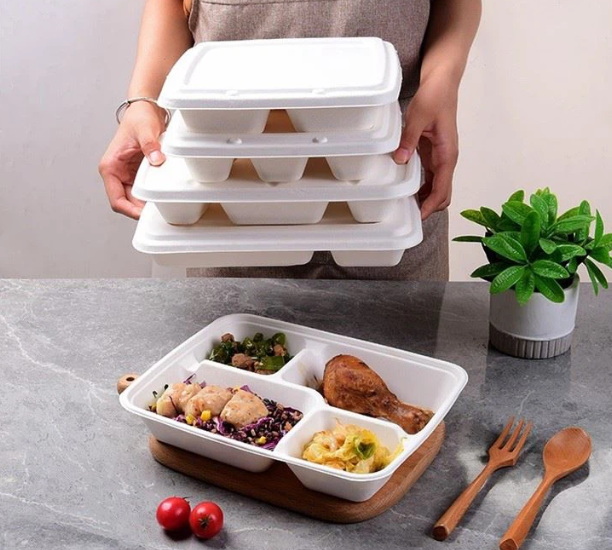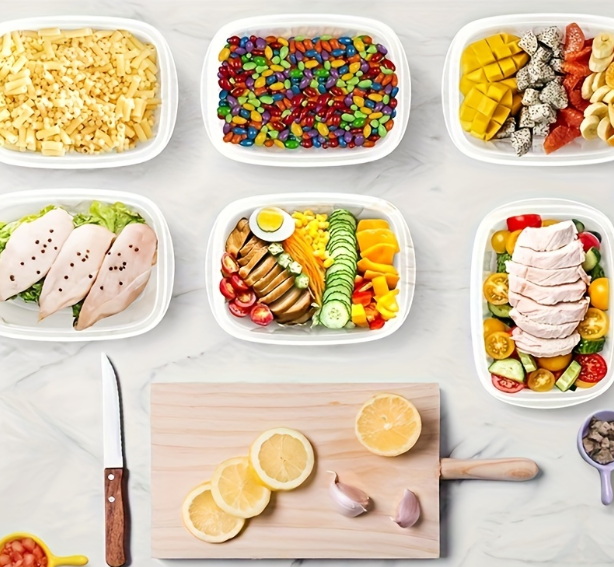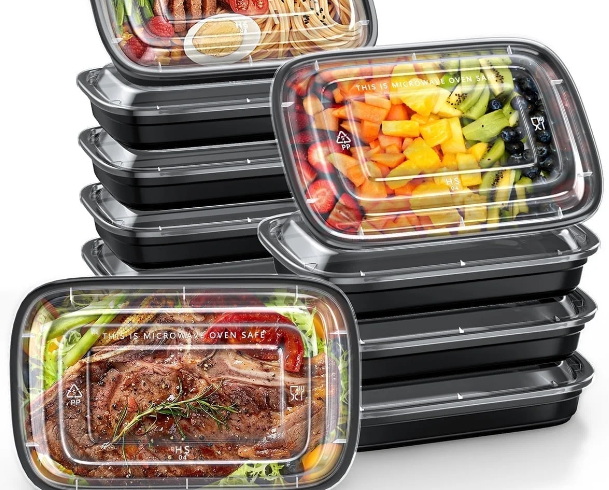
Content Menu
● Understanding Disposable Lunch Boxes with Lids
>> Common Materials
● Durability Factors of Disposable Lunch Boxes with Lids
>> Material Strength and Heat Resistance
>> Lid Design and Seal Integrity
>> Handling and Reuse
● Comparing Disposable Lunch Boxes with Reusable Options
● Practical Durability: Daily Use Scenarios
>> Office and School Use
>> Food Service and Catering
>> Environmental Considerations
● Maintenance Tips to Extend Durability
● Conclusion
● FAQ
>> 1. How long can a disposable lunch box with lid last if reused daily?
>> 2. Are disposable lunch boxes with lids leak-proof?
>> 3. Can disposable lunch boxes with lids be microwaved?
>> 4. Are disposable lunch boxes with lids environmentally friendly?
>> 5. How should I clean a disposable lunch box with lid if I want to reuse it?
● Citations:
Disposable lunch boxes with lids have become increasingly popular for their convenience, portability, and hygienic benefits. However, questions often arise about their durability, especially when used daily. This comprehensive article explores the durability of disposable lunch boxes with lids, examining materials, design, practical usage, and environmental considerations. We will also compare disposable options with reusable lunch boxes to provide a well-rounded perspective.

Understanding Disposable Lunch Boxes with Lids
Disposable lunch boxes with lids are typically made from materials such as polypropylene (PP), paperboard with bioplastic lining, or other plastics designed for single or limited use. They come in various shapes, sizes, and compartmental designs to accommodate different meal types.
Common Materials
- Polypropylene (PP): A durable plastic that is lightweight, resistant to heat (up to certain temperatures), and often used for disposable lunch boxes with lids. For example, the KE-3-A disposable lunch box is made from food-safe polypropylene and features a clear lid for visibility[2][4].
- BioBoard (Paperboard with Bioplastic Lining): These are eco-friendly disposable lunch boxes made from FSC™ Mix certified paper, lined with plant-based bioplastic (PLA). They are industrially compostable and suitable for both hot and cold foods[5].
Durability Factors of Disposable Lunch Boxes with Lids
Material Strength and Heat Resistance
Disposable lunch boxes made from polypropylene are known for their durability relative to other single-use plastics. They can withstand temperatures ranging from approximately -5°C to 85°C, making them suitable for cold and warm foods but generally not for microwave use at high wattages[2][4]. The robust design of some PP lunch boxes offers stability and resistance to warping under normal use conditions[4].
BioBoard lunch boxes, while sturdy, are designed primarily for one-time use and compostability rather than long-term durability. They perform well for short-term food transport but may not withstand repeated use or exposure to moisture over extended periods[5].
Lid Design and Seal Integrity
The lid is a critical component for maintaining food freshness and preventing leaks. Disposable lunch boxes with lids often feature snap-on or hinged lids designed to create a secure seal. For example, the KE-3-A lunch box has a clear lid that fits snugly to keep food organized and mess-free[2].
However, compared to reusable lunch boxes, disposable lids may be less resistant to cracking or deformation if handled roughly or used repeatedly. Their sealing mechanisms are generally not as robust as those found on durable, reusable lunch containers.
Handling and Reuse
Though disposable lunch boxes are intended for single use, some users may attempt to reuse them. Hand washing with warm soapy water is recommended if reuse is necessary, but harsh scrubbing or exposure to high heat can cause warping or damage[2]. Generally, disposable lunch boxes with lids are not designed for long-term durability; repeated use will likely degrade their structural integrity.
Comparing Disposable Lunch Boxes with Reusable Options
To understand durability better, it's helpful to compare disposable lunch boxes with reusable ones.
| Feature | Disposable Lunch Box with Lid | Reusable Lunch Box |
| Material | Polypropylene, paperboard with bioplastic | Stainless steel, durable plastic, glass |
| Durability | Designed for single or limited use | Designed for long-term daily use |
| Heat Resistance | Moderate (up to ~85°C for PP) | High (microwave, dishwasher safe options) |
| Leak Resistance | Moderate, depends on lid design | High, often with silicone seals |
| Environmental Impact | Single-use, compostable options available | Reusable, less waste generated |
| Cost | Low per unit | Higher initial cost, cost-effective over time |
Reusable lunch boxes, such as stainless steel models, offer superior durability, leak resistance, and repairability but lack the convenience of disposability[1]. Disposable lunch boxes with lids provide convenience and hygiene but sacrifice long-term durability.

Practical Durability: Daily Use Scenarios
Office and School Use
For daily office or school lunches, disposable lunch boxes with lids offer a hygienic, no-cleanup solution. Their durability is sufficient for carrying meals in bags or backpacks without damage if handled carefully. However, they are prone to cracking or lid deformation if dropped or squeezed excessively.
Food Service and Catering
In commercial settings, disposable lunch boxes are favored for their convenience and cost-effectiveness. Their durability is adequate for transport and short-term storage. The BioBoard lunch boxes, for instance, are sturdy enough for grab-and-go stores and catering but are intended for single use[5].
Environmental Considerations
While disposable lunch boxes with lids are convenient, their environmental impact is a concern. Compostable options like BioBoard reduce landfill waste but require industrial composting facilities. Polypropylene boxes are recyclable but often end up as waste if not properly disposed of[5].
Maintenance Tips to Extend Durability
If you choose to reuse disposable lunch boxes with lids, consider these tips to prolong their usability:
- Hand wash gently with warm soapy water; avoid harsh scrubbing[2].
- Do not expose to high heat or microwave use beyond recommended wattage[4].
- Dry thoroughly before storing to prevent warping or bacterial growth.
- Avoid stacking heavy items on top to prevent crushing.
Conclusion
Disposable lunch boxes with lids offer a practical, hygienic solution for carrying meals, especially for single or limited use. Their durability is generally sufficient for daily transport and short-term storage, particularly when made from polypropylene or similar sturdy materials. However, they are not designed for long-term daily reuse, as repeated washing and handling can degrade their structure and sealing ability.
For those seeking longevity and repairability, reusable lunch boxes made from stainless steel or durable plastics are superior but come with higher upfront costs and maintenance requirements. Compostable disposable lunch boxes provide an eco-friendly alternative but still lack the durability of reusable containers.
In summary, disposable lunch boxes with lids strike a balance between convenience and durability suitable for daily use when treated with care and disposed of appropriately.

FAQ
1. How long can a disposable lunch box with lid last if reused daily?
A disposable lunch box with lid can last a few uses if handled carefully and washed gently by hand, but it is not designed for long-term daily reuse. Typically, signs of wear such as cracking or lid deformation appear after several uses[2].
2. Are disposable lunch boxes with lids leak-proof?
Many disposable lunch boxes with lids offer a reasonably secure seal to prevent leaks during transport. However, they are generally less leak-proof than reusable lunch boxes with silicone seals. The effectiveness depends on the lid design and material[2][4].
3. Can disposable lunch boxes with lids be microwaved?
Some polypropylene disposable lunch boxes can withstand microwave use up to certain wattages (usually under 800 watts). However, many are not recommended for microwave use, especially at high power, as this can warp or damage the container[2][4].
4. Are disposable lunch boxes with lids environmentally friendly?
Traditional disposable lunch boxes contribute to waste, but compostable options like BioBoard lunch boxes lined with PLA bioplastic are industrially compostable and more environmentally friendly[5]. Proper disposal is essential to minimize environmental impact.
5. How should I clean a disposable lunch box with lid if I want to reuse it?
Hand wash gently with warm soapy water, avoid harsh scrubbing, and dry thoroughly before reuse. Avoid dishwasher use and high heat exposure to prevent warping or damage[2].
Citations:
[1] https://www.nytimes.com/wirecutter/reviews/best-kids-lunch-boxes/
[2] https://www.katachiware.com.au/bento-boxes/disposable-bento-boxes/disposable-lunch-box/
[3] https://www.thespruceeats.com/best-lunch-containers-5087549
[4] https://www.mviecopack.com/disposable-pp-plastic-black-rectangle-lunch-box-with-transperent-lid-product/
[5] https://www.biopak.com/hk/containers-lids/containers/lunch-boxes
[6] https://www.srlongroup.com/disposable-food-containers-a-complete-guide/
[7] https://manluenpack.en.made-in-china.com/product/gQPRdJEyvhVY/China-Disposable-PP-Plastic-Bento-Lunch-Box-5-Compartment-Takeaway-Food-Packaging-Microwavable-Plastic-Food-Containers.html
[8] https://www.mviecopack.com/disposable-lunch-box/
[9] https://www.biopak.com/au/containers-lids/containers/lunch-boxes
[10] https://www.aliexpress.com/i/1005004725514028.html
[11] https://www.sistemaplastics.com/food-storage/lunch-boxes
[12] https://kidseatincolor.com/stainless-steel-lunchboxes/
[13] https://www.restaurantware.com/collections/disposable-take-out-boxes
[14] https://beyondplastic.com.hk/collections/disposable-food-container
[15] https://www.thekitchn.com/megatesting-best-lunch-containers-23407564
[16] https://chinafoodcontainer.en.made-in-china.com/product/XZzfCDKknQpl/China-Biodegradable-Disposable-Durable-Paper-Box-with-Lids.html
[17] https://www.walmart.com/c/kp/disposable-lunch-box
[18] https://www.nytimes.com/wirecutter/reviews/best-food-storage-containers/
[19] https://www.cater4you.co.uk/acatalog/plastic-take-away-tubs-and-containers.html
[20] https://www.wastereduction.gov.hk/en/schools/green_lunch.htm

















